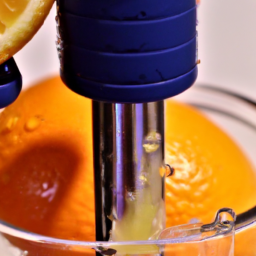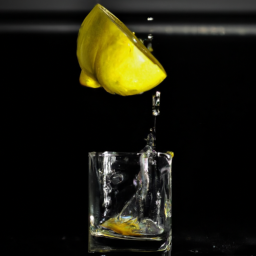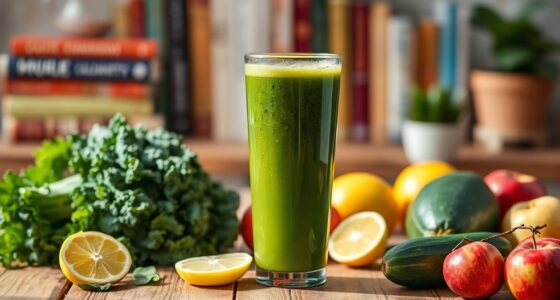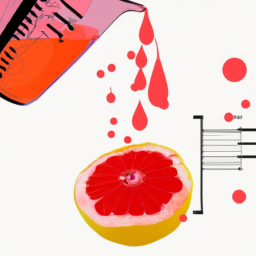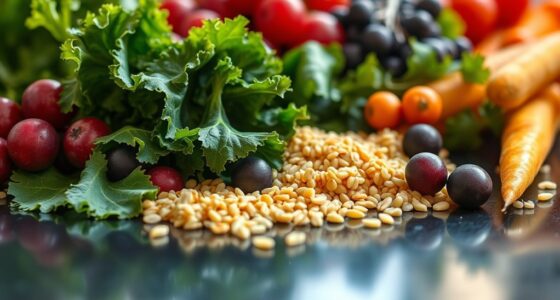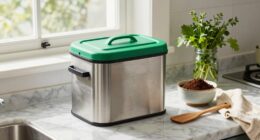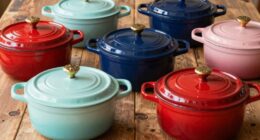I am a huge fan of beginning my day with a glass of freshly squeezed orange juice, but I have always wondered how much juice can actually be obtained from one orange. Curiosity got the best of me, and I decided to investigate this mystery. In this article, I will uncover the different factors that affect juice yield, different juicing techniques, and tips for choosing the best oranges for juicing.
Oranges are one of the most popular fruits in the world, and they come in different varieties, each with its unique flavor and juiciness. Factors like the type of orange, ripeness, and juicing technique can affect the amount of juice you can extract from one orange.
If you are a juicing enthusiast or just curious like me, keep reading to find out how much juice you can get from one orange and how to maximize your juice yield.
Key Takeaways
- One medium orange typically produces about 1/4 to 1/3 cup of juice.
- Factors that affect juice yield include the type of orange, ripeness, and juicing technique.
- Firm, heavy oranges with smooth skin and no blemishes maximize juice yield.
- Different juicing techniques, such as using a juicer or citrus press, can extract maximum juice.
Types of Oranges
Do you ever wonder which type of orange will yield the most juice for your morning glass of OJ? Well, there are several orange varieties out there, and each one has its unique flavor profile.
Some of the most common types of oranges you’ll find in the grocery store include Valencia, Navel, Blood, and Cara Cara oranges. Valencia oranges are known for their sweet and tart flavor and are often used in orange juice production.
Navel oranges, on the other hand, have a sweeter taste and are best consumed fresh. Blood oranges have a distinct reddish hue and a slightly bitter taste, making them ideal for cocktails and marmalades. Lastly, Cara Cara oranges have a pinkish flesh and a sweeter taste, making them a popular choice for salads and desserts.
Knowing the different flavor profiles of each orange variety can help you choose the perfect one for your morning glass of juice. Factors affecting juice yield include the ripeness of the fruit, the juicing method, and the temperature of the fruit.
Factors Affecting Juice Yield
To increase the amount of juice you get from an orange, try using a citrus juicer or rolling the fruit on a hard surface before squeezing. However, there are other factors that can affect the juice yield as well.
One of the most important factors is the ripeness level of the orange. When an orange is too ripe, it may feel soft or mushy, and the skin may start to wrinkle or even mold. While these oranges may still be edible, they tend to have a lower juice content than firmer, fresher oranges.
On the other hand, if the orange is not quite ripe, the juice may be more difficult to extract and the flavor may not be as developed. Therefore, it is important to choose oranges that are at the appropriate level of ripeness for juicing.
Moving on to juicing techniques, there are many different methods you can try to get the most juice out of your oranges.
Juicing Techniques
There are various methods for extracting the maximum amount of liquid from a citrus fruit. When it comes to oranges, there are different juicing techniques that can be used to get the most juice out of them. One popular method is to use an orange juicing equipment, such as a juicer or a citrus press. These tools allow you to extract the juice from the fruit without having to manually squeeze it, which can be time-consuming and tiring.
However, it is important to take juicing safety precautions when using these tools. For example, make sure to read the manual carefully and follow the instructions on how to use the equipment properly. Also, always wash the oranges before juicing them to remove any dirt or bacteria that may be on the skin. By using the appropriate equipment and following the necessary precautions, you can ensure that you get the maximum amount of juice from each orange.
When it comes to getting the most juice out of an orange, the juicing technique you use can make a big difference. In the next section, we will explore just how much juice you can expect to get from one orange using different juicing methods.
How Much Juice Can You Get from One Orange?
Juicing an orange can result in a refreshing glass of citrus nectar that can transport you to a sunny orchard on a warm summer day. But before you start juicing, you may be wondering how much juice you can get from just one orange.
The answer varies depending on the size and juiciness of the orange, but on average, one medium-sized orange can produce about 1/4 to 1/3 cup of juice.
While the amount of juice may seem small, orange juice benefits are plentiful. Oranges are rich in vitamin C, potassium, and folate, making it a great addition to your daily diet.
To get the most juice out of your orange, it’s important to have the right juicing equipment. A citrus juicer or hand-held squeezer can easily extract the juice from the orange without too much effort.
When it comes to juicing oranges, it’s important to choose the best ones for the job. In the next section, we’ll discuss how to choose the juiciest oranges for optimal juice extraction.
How to Choose the Best Oranges for Juicing
Get ready for a burst of tangy flavor by selecting the juiciest oranges for your next glass of citrus goodness. When it comes to juicing, choosing the right oranges is crucial to achieving maximum juice yield.
Look for oranges that are firm and heavy for their size, as this indicates they’re full of juice. The skin should be smooth and free of any blemishes or soft spots.
In addition to selecting the right oranges, it’s important to have the proper juicing equipment and to store your citrus correctly. A high-quality juicer will extract the maximum amount of juice from your oranges, while a citrus squeezer can be a great option for smaller quantities.
When storing your oranges, keep them in a cool, dry place away from direct sunlight. This will help to preserve their freshness and juiciness.
With these tips in mind, you’ll be on your way to enjoying a delicious glass of freshly squeezed orange juice in no time. Now, let’s move on to some tips for maximizing juice yield.
Tips for Maximizing Juice Yield
In the previous section, we discussed how to choose the best oranges for juicing. Now that you have your oranges, the next step is to maximize the juice yield. This can be achieved by using the proper juicing equipment and techniques.
Firstly, it is important to note that there are two main methods of juicing: squeezing and reaming. Squeezing involves manually squeezing the juice out of the orange, while reaming involves using a specialized tool called a reamer to extract the juice. In general, reaming tends to yield more juice than squeezing. However, if you do not have a reamer, squeezing can still be effective. To maximize juice yield, make sure to use fresh oranges that are at room temperature. Cold oranges produce less juice because the cold temperature can stiffen the membranes inside the fruit. Also, try rolling the orange on a hard surface before juicing to break down the membranes and release more juice.
To help you get the most juice out of your oranges, here is a table comparing squeezing and reaming methods:
| Method | Pros | Cons |
|---|---|---|
| Squeezing | No specialized equipment required; can be done by hand | Yields less juice than reaming; can be messy |
| Reaming | Yields more juice than squeezing; less pulp in the juice | Requires a specialized tool; can be more expensive |
Now that you know how to maximize your orange juice yield, let’s move on to the next step – using orange juice in recipes.
Using Orange Juice in Recipes
Let’s explore how adding a splash of fresh-squeezed orange juice to your favorite recipes can bring a burst of sunny flavor and elevate your dishes to a whole new level of deliciousness.
Orange juice is a versatile ingredient that can be used in both sweet and savory dishes. It’s a great addition to cocktails, adding a zesty kick to classics like mimosas and screwdrivers. Incorporating orange juice into smoothies can also add a refreshing twist, making them even more enjoyable to drink.
But orange juice can be used for more than just beverages. It can be used as a marinade for meats, giving them a tangy edge. It can also be used to add depth to sauces and dressings, balancing out the flavors.
The possibilities are endless when it comes to using orange juice in recipes. Now, let’s move on to the nutritional value of orange juice.
Nutritional Value of Orange Juice
I find it fascinating to learn about the nutritional value of orange juice. It’s packed with vitamins and minerals, such as vitamin C, folate, and potassium, which are essential for our overall health.
Additionally, orange juice contains antioxidants that help protect our cells from damage caused by free radicals.
Lastly, drinking orange juice can also provide hydration benefits, making it a great choice for staying hydrated throughout the day.
Vitamins and Minerals
You’ll love knowing that not only does an orange produce delicious juice, but it’s also packed with essential vitamins and minerals. Juice extraction from oranges is a popular method to consume these nutrients.
Oranges are an excellent source of vitamin C, which helps boost the immune system and contributes to the formation of collagen in the body. Additionally, orange juice contains vitamin A, which is essential for proper vision and healthy skin. It also contains potassium, which helps regulate blood pressure and muscle function.
In addition to vitamins, orange juice is also a source of minerals. Calcium is important for strong bones and teeth, and oranges contain a small amount of this mineral. Magnesium, which helps regulate muscle and nerve function, is also present in orange juice. Finally, oranges have trace amounts of iron, which is needed to produce healthy red blood cells.
The health benefits of orange juice go beyond just its delicious taste and refreshing qualities. Antioxidants are another important aspect to consider, which we will explore in the next section.
Antioxidants
Hey, did you know that drinking a glass of freshly squeezed orange juice can provide you with a good amount of antioxidants to help protect your body? Antioxidants are compounds that help neutralize free radicals in the body, which can cause damage to cells and contribute to chronic diseases. Oranges are one of the best sources of these beneficial antioxidants.
In fact, oranges are rich in a variety of antioxidants, including vitamin C, carotenoids, and flavonoids. Vitamin C is perhaps the most well-known antioxidant found in oranges, and it plays a critical role in immune function, wound healing, and collagen production. Carotenoids, such as beta-carotene and lutein, are also important antioxidants that help protect the eyes and skin from damage. Flavonoids, including hesperidin and narigenin, have been shown to improve blood flow and reduce inflammation in the body. So, not only does a glass of orange juice taste great, but it also provides a whole host of health benefits.
Now, let’s move on to talk about the hydration benefits of drinking orange juice.
Hydration Benefits
Don’t underestimate the power of a refreshing glass of freshly squeezed orange juice when it comes to keeping your body hydrated. As someone who struggles with drinking enough water throughout the day, I find that incorporating orange juice into my daily routine helps me stay hydrated.
Here are a few reasons why:
-
The importance of hydration cannot be overstated. Our bodies rely on water to regulate temperature, transport nutrients, and remove waste. Without enough water, we can experience headaches, fatigue, and dry skin.
-
Drinking orange juice is a delicious way to stay hydrated. Not only does it contain water, but it also has natural sugars and electrolytes that can help replenish lost fluids.
-
Dehydration can have negative effects on our health, including decreased cognitive function and impaired physical performance. By staying hydrated with orange juice, we can help prevent these issues.
-
Plus, drinking orange juice is a great way to stay hydrated without consuming sugary sodas or energy drinks that can be harmful to our health.
In the next section, we’ll explore how to store orange juice to ensure maximum freshness and taste.
How to Store Orange Juice
Congratulations, you’ve decided to store your orange juice! Now, let’s talk about how to keep that juicy goodness from turning into a science experiment gone wrong.
The best storage tip is to keep your orange juice in an airtight container, like a glass jar or a plastic bottle with a tight-fitting lid. This will prevent air and moisture from getting in and causing the juice to spoil.
Freshness tips include keeping the juice refrigerated and consuming it within a few days of opening. If you don’t plan on drinking it right away, you can freeze it for long term preservation. To do this, pour the juice into an ice cube tray and freeze until solid.
Once frozen, transfer the juice cubes to a freezer-safe container or bag. This way, you can thaw only what you need and avoid wasting the rest.
Remember, the key to keeping your orange juice fresh and tasty is to minimize exposure to air and moisture, so be sure to seal it tightly before storing.
Frequently Asked Questions
How long can freshly squeezed orange juice be stored in the fridge?
Freshly squeezed orange juice can be stored in the fridge for up to 3 days. To maintain flavor, store in an airtight container and avoid exposure to light and heat. Flavor changes may occur after the first day.
Are there any health benefits to drinking orange juice?
Drinking orange juice offers numerous health benefits thanks to its high nutritional value. Juicing techniques can affect the amount of nutrients in the juice, but overall, consuming orange juice regularly can boost immune function, improve heart health, and reduce inflammation.
Can you juice an orange with the peel on?
Wow, juicing an orange with the peel on is a game changer! The juicing technique may seem unorthodox, but the peel actually contains more nutritional value than the fruit itself. Give it a try and see the difference for yourself.
How does the temperature of the oranges affect juice yield?
Juice extraction from oranges is influenced by temperature. Warmer oranges produce more juice due to increased fluidity of the juice sacs. Acidity level also affects yield, as higher acidity can impede extraction.
How much sugar is in a glass of orange juice?
I researched the nutritional value of orange juice and found that a glass typically contains around 22 grams of sugar. While high in sugar, it also contains vitamin C and other beneficial nutrients.
Conclusion
In conclusion, juicing oranges can be a great way to incorporate vitamins and nutrients into your diet. The amount of juice one orange makes can vary based on factors such as the type of orange, juicing technique, and ripeness. However, with some tips and tricks, it’s possible to maximize the juice yield and get the most out of your oranges.
Juicing an orange is like squeezing sunshine into a glass, and the nutritional benefits are numerous. Orange juice is high in vitamin C, folate, and potassium, making it a great addition to any meal or snack. To get the most out of your orange juice, it’s important to choose the best oranges for juicing and to store the juice properly.
With these tips in mind, it’s easy to enjoy a refreshing glass of orange juice any time of day.
